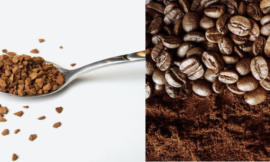Coffee is the world’s most popular beverage, enjoyed by billions every day for its unique flavor and ability to boost energy and mood. Coffee has a mixed reputation when it comes to health. While some claim it is unhealthy due to the caffeine, others swear by the health benefits of a daily cup of joe.
The truth is, moderate coffee consumption (2-3 cups per day) is said to have several health advantages. Here are 12 health benefits of drinking coffee:
1. Coffee is High in Antioxidant
Coffee is loaded with powerful antioxidants like caffeic acid and chlorogenic acid that help neutralize free radicals. These free radicals can damage cells and raise the risk of chronic diseases like heart disease and cancer.
2. Coffee may Reduce Type 2 Diabetes Risk
it is said that drinking coffee can significantly lower your risk of developing type 2 diabetes. This is partly because coffee helps make cells more sensitive to insulin.
3. May lower risk of various cancers
Coffee drinkers have a lower risk of liver, prostate, endometrial and colorectal cancers. The antioxidants in coffee fight oxidative damage to DNA and may help kill cancer cells.
4. May protect your brain as you age
Coffee drinkers have a much lower risk of developing neurodegenerative conditions like Parkinson’s and Alzheimer’s diseases. Caffeine and coffee antioxidants help protect brain cells from damage.
5. Can boost energy levels and mood
The caffeine in coffee acts as a mild stimulant, improving alertness, concentration, mood, reaction times and general mental performance. It can also temporarily suppress appetite and boost metabolism.
6. May improve exercise performance
Caffeine can act as a performance enhancer for athletes and exercisers. In addition to the benefits already listed, caffeine has been shown to:
- Increase time to exhaustion. Studies show caffeine can increase time to exhaustion during endurance exercise like cycling or running by up to 24%.
- Improve muscle contraction. Caffeine may help muscles contract more forcefully, leading to better performance during high-intensity exercise.
- Enhance fat burning. Caffeine can stimulate the release of fatty acids from fat tissues, potentially boosting fat burning during exercise.
7. May lower risk of gout
Coffee drinkers have a significantly lower risk of developing gout, a type of painful arthritis caused by uric acid buildup. Studies show coffee lowers uric acid levels in the blood and reduces gout risk by up to 40%.
8. May improve liver health
Drinking coffee has been linked with a lower risk of both liver cirrhosis and liver cancer. The antioxidants in coffee help fight oxidative stress and inflammation in the liver.
9. Can help in weight loss
Caffeine, a key ingredient in coffee, can boost metabolism by 3-11% and temporarily increase fat burning. This means coffee can help you lose weight and body fat over time.
10. May improve dental health
Some studies show that drinking coffee may reduce your risk of cavities, gum disease and bad breath. This is because coffee contains compounds that can kill the bacteria that cause these oral health issues.
11. May lower risk of certain heart conditions
Coffee drinkers have a lower risk of stroke, heart failure and coronary heart disease. This is partly because coffee improves blood vessel function and lowers blood pressure, at least in the short term.
12. May lower risk of depression
Several studies have found that coffee drinkers have a significantly lower risk of depression. Caffeine and coffee antioxidants may help improve mood, energy levels and brain function – all of which can benefit those with depression.
What is in coffee that gives these health benefits?
There are several compounds in coffee that contribute to its potential health benefits:
- Caffeine: 1-2% by weight, providing 80 to 100 mg per 8 oz cup
- Chlorogenic acids: 5-10% by weight, providing 50 to 300 mg per cup
- Cafestol and kahweol: Around 5-10 mg per cup
- Trigonelline: 0.8-1.5% by weight, providing 20 to 50 mg per cup
- Magnesium: 0.03-0.04% by weight, providing 5-10 mg per cup
- Potassium: 0.2% by weight, providing 100-200 mg per cup
- Niacin: 0.02% by weight, providing 1-2 mg per cup
- Manganese: Traces
- Caffeine:
This is the most well-known component of coffee. Caffeine has been shown to improve energy, focus, metabolism and exercise performance. It may also help reduce the risk of certain diseases. - Chlorogenic acid:
This antioxidant compound may help lower blood sugar levels, reduce inflammation and protect against oxidative damage. It may also inhibit the growth of cancer cells. - Cafestol and kahweol:
These diterpenes found in coffee oils have been linked to benefits like reduced inflammation and lower cholesterol levels. - Trigonelline:
This alkaloid present in coffee beans may help regulate blood sugar, reduce inflammation and protect against liver damage. It also acts as an antioxidant. - Magnesium and potassium:
Coffee contains small amounts of minerals like magnesium and potassium, which are important for heart health, muscle function and blood pressure regulation. - Niacin and manganese:
Coffee is also a source of B vitamins like niacin and trace minerals like manganese.
While the exact amounts can vary, in general caffeine and chlorogenic acids appear to be the most abundant compounds in coffee that contribute to its health effects. Caffeine provides the mental and physical benefits, while chlorogenic acids act as antioxidants and may help regulate blood sugar and reduce inflammation.
The other compounds – trigonelline, minerals, and B vitamins – are present in smaller amounts but may still provide health benefits in combination with caffeine and chlorogenic acids. The synergistic effect of all these compounds together likely contributes to coffee’s potential to reduce risk for various diseases.
The other side of coffee consumption
Although coffee is said to have all the above and even more health benefits, there is no real evidence of the same. The studies are few and on very small number of participants. Either way, coffee is not a substitute for exercise, diet or medication to stay healthy and this article in no way promotes dependence on coffee alone to get all the above benefits. Just like the benefits, coffee is also supposed to have some harmful effects on the body.
Drawbacks of Coffee
While coffee does have potential health benefits, too much can cause:
• Anxiety, insomnia and irritability due to caffeine’s effects.
• Acid reflux and stomach upset in sensitive individuals.
• Increased risk of osteoporosis and fractures in women who drink 4+ cups per day.
So in conclusion, enjoying 2-3 cups of coffee per day may provide some health benefits for many people. However, excessive consumption may lead to health damages as well, so moderation is the key. ☕️☕️




